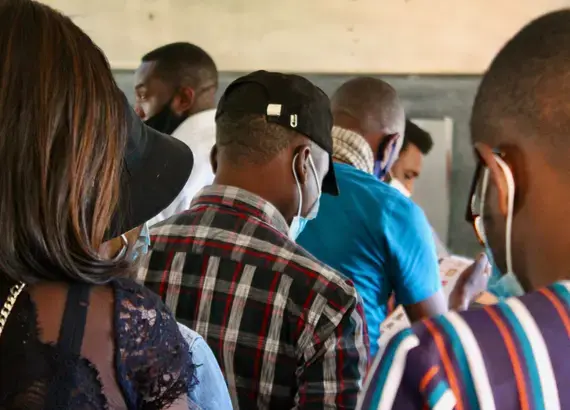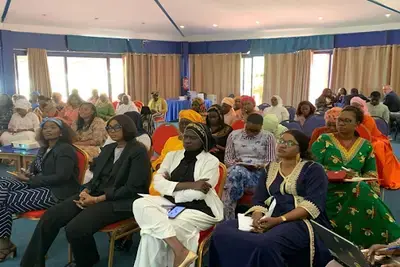
Success Story
Citizen Election Observers Are Being Hampered by Increased Restrictions
Just weeks before the August general elections in Zambia, the Electoral Commission of Zambia (ECZ) released a series of revised accreditation requirements for citizen election observers that significantly hampered their ability to accredit observers across the country. Among the new regulations, citizen groups were required to provide evidence of at least three years of governance experience and each individual observer had to complete a certified application form in triplicate as well as submit certified copies of each observer’s national ID card. The adoption of these measures are in contrast to past elections when citizen groups were only required to submit the names, national ID numbers and a non-certified application for observers, which dramatically increased the administrative and financial strain on groups and diverted attention away from observation in the runup to election day.
These types of requirements create an unwarranted burden on the freedom of association and on the right of citizens to take part in public affairs through election monitoring, in violation of international human rights obligations and standards for domestic election monitoring. The right to take part in public affairs – which includes direct activities such as election monitoring, the right to genuine elections – which includes activities by citizens to ensure that this right is respected, the right to seek and impart information about the conduct of election processes and the right to associate to accomplish these activities combine to protect those who seek to join together to monitor elections. These rights are outlined in the International Covenant on Civil and Political Rights (ICCPR) and reinforced in the Declaration of Global Principles for Nonpartisan Election Observation and Monitoring by Citizen Organizations. Further regional standards, such as the Principles for Election Management, Monitoring, and Observation in the SADC Region, call on election management bodies (EMBs) to “ensure that the accreditation process for observers and monitors is speedy, efficient and non-discriminatory.” As such, legal and administrative guidelines regulating observers should strive to protect and promote the roles and rights of observers while introducing only the necessary administrative procedures required to maintain order in the election process.
Citizen election monitors often seek to deploy thousands of observers on election day, an intensive effort that can collapse under challenging accreditation processes. Despite the well-recognized and widely accepted practice of nonpartisan citizen election monitoring around the world, NDI and its partners are seeing increasing trends in the use of complex accreditation procedures that can limit the ability of citizen groups to recruit, train, and deploy observers on election day. Restrictive accreditation procedures typically present some of the following challenges:
-
Logistical barriers - This includes requirements that are operationally or organizationally difficult to meet. This often includes unreasonable application and/or identification requirements for individual observers (as opposed to simply accrediting the organization), placing the burden on the organization to collect, organize, and submit a tremendous amount of information, often in an inconvenient or inefficient manner.
-
Restrictions on size/movement - Some accreditation requirements have sought to create limitations on where or how many observers can be deployed in a certain area, in some cases requiring observers to be accredited to specific polling stations which can undermine observer deployment methodologies and increase opportunities for fraud when electoral actors know where observers will and won’t be.
Timing barriers - This can include accreditation windows that are too short for groups to effectively meet them, windows that close too far in advance of election day when groups may not yet have recruited all their observers, or processes that open too late in the election cycle when groups are overwhelmed with other activities. -
Lack of transparency/clarity - Sometimes accreditation procedures and requirements are intentionally vague to discourage groups from successfully applying, and/or little transparency around the criteria for and approval of groups, leaving the composition of election day observers up to the discretion of the government or EMB and often politicizing the process.
An EMB’s ability to technically execute their own accreditation process - for instance how quickly they can approve applications and develop and deploy accreditation badges (or other necessary identification) - can also make or break an election day observation. Poorly trained election officials with limited resources or equipment to meet accreditation demands can significantly impede the process. Late arriving, incorrect, or missing accreditation badges have impacted the quality and quantity of several recent citizen election monitoring efforts, in Africa and other parts of the world.
A regional survey by NDI’s Zambia country office demonstrated how these kinds of restrictions vary from country to country, and that many countries in the region still had some problems in their accreditation regime, though some are more substantial than others. For instance, in Kenya applications are not required for individual observers, however, groups still have to upload scanned copies of national ID cards for all potential observers. Malawi’s accreditation timeline was short, however observer groups only have to submit the list of names of their observers to the EMB, a much less cumbersome process. In Tanzania, the accreditation process window was a full two months, easing some timing challenges. However, the approval process was opaque and arbitrary, with many credible groups denied credentials without explanation or the ability to seek redress. NDI has seen similar variations and weaknesses in other regions around the world.
Increasingly burdensome accreditation procedures threaten the ability for citizens to effectively safeguard elections, build confidence in the process, and hold institutions accountable. It’s critical for local, regional and international actors to reject undue constraints on election observers to stymie the normalization and institutionalization of such practices. Where possible, election reform efforts and post-election recommendations should seek to enshrine observer rights into the legal framework to curtail future manipulation.
NDI quickly pulled together accreditation requirements from other countries in the region and across the continent to provide our Zambian partner with comparative information to join with other CSOs to advocate for an extension of the accreditation period in response to the new, late-announced and onerous requirements. The Zambian electoral commission later extended the accreditation process twice to provide time for interested CSOs and parties to meet the requirements. More broadly, NDI continues to work with the Global Network of Domestic Election Monitors (GNDEM) to highlight intensifying attacks on the rights of observers with the international community and promote global standards to protect the rights of CSOs to observe elections. NDI will also be convening leading citizen election observation experts over the next year to build consensus on action plans to protect observer rights at the regional, national and global levels.
NDI is a non-profit, non-partisan, non-governmental organization that works in partnership around the world to strengthen and safeguard democratic institutions, processes, norms and values to secure a better quality of life for all. NDI envisions a world where democracy and freedom prevail, with dignity for all.



